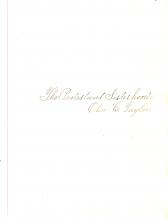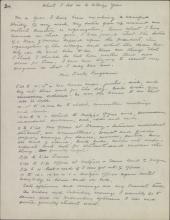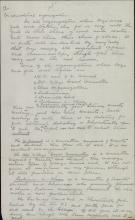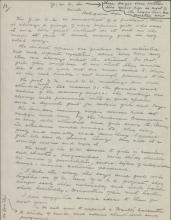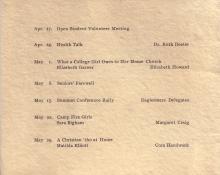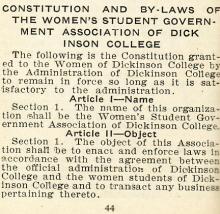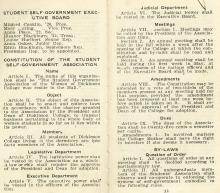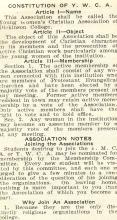Olive C. Taylor's Senior Oration "The Prostestant Sisterhood," 1900
In her senior oration "The Protestant Sisterhood," Olive Taylor discussed the centrality of women in religious communities throughout history. She argues that women's activity as reformers and missionaries within the church in the late nineteenth and early twentieth centuries was unprecedented. For the first time, she asserted, protestant women were leaving the private sphere and working independently within the public sphere. However, Olive argued, women were still being the motherly figures they were born to be.
"The Y.W.C.A. and Religous Life" in " Women at Dickinson College" - by Josephine Brunyate Meredith
In her essay, "Women at Dickinson College," Josephine Brunyate Meredith took an in depth look at female students' role in religious life. She first looked at the Y.W.C.A., citing them as "somewhat of a problem" because they did not "reach many girls in a vital way...and lack definite objectives." However, the joint Y.W.C.A. and Y.M.C.A. meetings were well executed and well attended. She also discussed the organization of student called the "Freshman Commission." The organization held a weekly service on Sunday evenings in Metzger Hall.
Dean Josephine B. Meredith's Report "Women at Dickinson College", circa 1935
During her time as the Dean of Women at Dickinson College, Dean Josephine Meredith wrote a report entitled "Women at Dickinson College." Dean Meredith, an early female graduate of Dickinson College (class of 1901), utilized both her experiences as a female student and the Dean of Women to compile a report on the conditions for and experiences of female students. Thus, in 18 sections, she highlights living conditions, extracurricular life, social life, religious life, and academic life at the College.
"Topics of the Y.W.C.A. of Dickinson College Winter and Spring Terms"
In a pamphlet entitled "Topics of the Y.W.C.A. of Dickinson College Winter and Spring Terms," Dickinson's Y.W.C.A. outlines there events for the year. Such events include discussions on aid to women in other countries, health, "Mormonism as a Menace" and "What a College Girl Owes to Her Home Church." They also scheduled joint meeting with Dickinson College's Y.M.C.A.
Â
Women's Student Government Association of Dickinson College
Under the Women's Student Senate, a separate organization from student senate that governed male students, the Women's Student Government Association of Dickinson College sought to "enact and enforce laws in accordance with the agreement between the official administration of Dickinson College and the women students of Dickinson and to transact any business pertaining thereto." This constitution, printed in the student handbook of 1920, included information on membership, meetings, the executive, lesgislative, and judicial departments, dues, amendment rules and by-laws.
Constitution of the Student Self-Government Association
The object of "The Student Government Association of the women of Dickinson College" (as refered to in the student handbook of 1919) was to "enact and enforce laws in accordance with the charter granted to the association by the President and Dean of Dickinson; to transact business pertaining to the whole body of women students in so far as it lies within its power." This association was comprised of officers and an executive board that made all final decisions.
Y.W.C.A. Constitution 1918-19
Included in the 1917-18 student handbook, published by the Christian
associations, is the full constitution of the Young Women's Christian
Association. Prior to 1913 only parts of the YWCA constitution were
printed in the student handbook. The constitution included information
on membership, meetings, Bible study, mission study, missionary work,
conventions, student conferences, and its mission statement. Article II
of the constitution states that the object of the organization "shall
be the development of Christian character in its members and the


